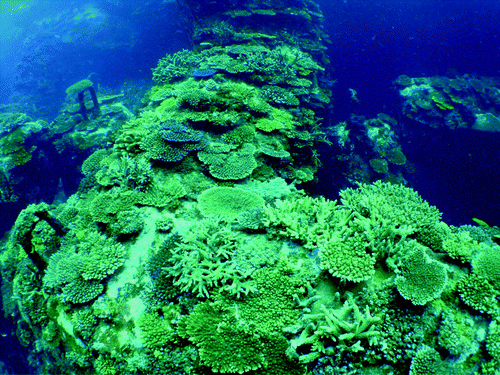Published in collaboration with the University of Bergen and the Institute of Marine Research, Norway, and the Marine Biological Laboratory, University of Copenhagen, Denmark
In the present issue of Marine Biology Research, Makoto Omori reviews causes for the degradation of coral reefs in Okinawa, Japan and he also describes current attempts to develop methods for reef restoration (Omori Citation2011). Deterioration of coral reefs has several anthropogenic causes, including farming and land development that causes soil run-off and eutrophication, damage caused by too many tourists and also extremely intensive fishing pressure – all of which can cause mechanical damage and overgrowth by macroalgae. Coral bleaching seems to have a lesser effect in the area, but predation on corals by crown-of-thorns sea stars (Acanthaster) is, for unknown reasons, a major problem around Okinawa, and attempts to eradicate the sea star populations have so far been ineffective. Other possible ways to improve the situation include artificially increasing the size of small islands and the creation of marine protected areas, but such protected areas are of only symbolic value – unless they are of a sufficiently large scale that anthropogenic factors which are detrimental to the reefs are brought under control and restrictions on the use of the protected areas are enforced. The necessary political and popular support for the restoration of coral reefs hinges on the cost of these attempts relative to the immediate economic value of the reefs that is based on income from fisheries and tourists.
The article also describes attempts to develop methods for restoration of reefs by enhancing settlement of coral larvae on artificial substratum () or by affixing coral fragments directly to rocks on the reefs, or, alternatively, through sexual reproduction, i.e. fertilization and larval settlement in a laboratory on land and culture in nursery with eventual transplantation in the sea. Direct transplantation of coral fragments is less work-intensive, but could potentially lead to a decrease in the genetic variation of the corals. However, provided that there are still in-situ survivors of the original reef corals or that coral fragments are collected from different individual colonies, this would seem to be a minor problem. The attempts have so far been made on rapidly growing coral species – especially the staghorn coral Acropora. The first few years of the study have so far been promising, although some mortality of transplants takes place as would be expected. But again, for restoration of reefs by the transplantation of corals to be successful, it is necessary to bring anthropogenic factors that are detrimental to the reefs under control.
Figure . Settlement of corals has been enhanced on the ‘Eco-Blocks’ installed at Naha Port in Okinawa, Japan. The ‘Eco-Block’ is a large, wave-dissipating block with unevenly processed surfaces that enhance natural recruitment of corals. The photograph was taken in August 2007, eight years after installation (for further information see Omori Citation2011; courtesy of Okinawa General Bureau).

Marine Biology Research is primarily devoted to all aspects of the biology of marine organisms emphasising basic research. However, with the review paper by Omori (Citation2011) we wish to signal that the journal will also welcome manuscripts treating aspects of applied marine biology given scientific substance and the significance of the treated problems.
Finally, some announcements regarding our Journal and the editorial board. Starting with this issue Marine Biology Research offers faster publication for its authors. With our Build Issue service, articles are entered straight into the online issue as soon as possible upon receipt of the corrected proofs. Articles thereby receive final page numbers at a far earlier stage in the publication process. We anticipate that this rapid production service will allow top-end research to reach its audiences even sooner, without compromising the peer-review process and whilst continuing to ensure our commitment to publishing research of the highest quality.
Recent changes on our editorial board: Ronald Thom left us as a subject editor for coastal management and monitoring. Thanks, Ron, for the great collaboration over the last three years! Ron is followed in this function by his research fellow Roy Kropp. Two subject editors who have also joined us are Leandro Bugoni (seabirds and marine reptiles) and Torsten Struck (phylogeny). Welcome to all!”
Notes
Published in collaboration with the University of Bergen and the Institute of Marine Research, Norway, and the Marine Biological Laboratory, University of Copenhagen, Denmark
References
- Omori M. 2011 . Degradation and restoration of coral reefs: Experience in Okinawa, Japan. Marine Biology Research 7 : 3 12 .